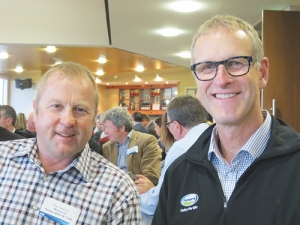Biosecurity tops priorities for agribusiness leaders - report
Biosecurity remains the top priority for agribusiness leaders, according to KPMG’s 2025 Agribusiness Agenda released last week.
 Special agricultural trade envoy Mike Petersen (left) and Fonterra director Michael Spaans at the launch of KPMG’s Agribusiness Report at Fieldays
Special agricultural trade envoy Mike Petersen (left) and Fonterra director Michael Spaans at the launch of KPMG’s Agribusiness Report at Fieldays
Ranked sixth in importance by industry leaders is the need to develop future leaders.
KPMG’s Ian Proudfoot says the primary sector needs people from a diverse range of backgrounds – including app developers and consumer experience experts, as much as scientists and farm labourers. “There is no silver bullet for attracting people into a primary sector career given the low profile the industry has in schools and the historic perceptions of those who influence career choices.
“The recurring theme of our discussions was that the issue is too big for any single organisation to address [by itself].
“There is an urgent need for a well-designed, carefully messaged and widely communicated pan-industry career awareness initiative. It must explain what the primary sector is, what it produces, who it sells to and what it contributes to New Zealand. It must be clear that the industry offers a huge diversity of career options – jobs that require many different skills, with ambition and a desire to succeed as the only common attributes.”
Proudfoot says any strategy must lift the engagement with schools and universities, especially in cities where young people gain only limited insight into the primary sector and are presented with few obvious pathways into careers.
He says sector leaders need to get into schools and tell students their career stories, and companies need to support teachers to incorporate primary sector themes into the curriculum. School camps need to become farm stay experiences, and urban farms developed to enable every kid to gain industry awareness.
The Meat Industry Association of New Zealand (MIA) today announced that Chief Executive Officer Sirma Karapeeva has resigned from the role.
The winners of the 2026 Hawke’s Bay/Wairarapa Dairy Industry Awards were announced at the annual awards dinner held at Copthorne Solway Park in Masterton on Thursday evening.
Environment Southland is welcoming this week’s decision by the Environmental Protection Authority (EPA) to approve the release of Blaptea elguetai, a leaf‑feeding beetle that will help control the highly invasive Chilean flame creeper.
This March, the potato industry is proudly celebrating International Women’s Day on 8 March alongside the International Year of the Woman Farmer, recognising the vital role women play across every part of the sector — from paddocks and packhouses to research, leadership, and innovation.
Fruit trader Seeka posted a record profit and returns to shareholders in 2025.
Recent weather events in the Bay of Plenty, Gisborne/Tairawhiti, and Canterbury have been declared a medium-scale adverse event.

OPINION: A mate of yours truly reckons rural Manawatu families are the latest to suffer under what he calls the…
OPINION: If old Winston Peters thinks building trade relations with new nations, such as India, isn't a necessary investment in…